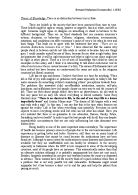Outline of There are no absolute distinctions between what is true and what is false, Discuss this claim.
Outline of TOK essay Vivian Kok 12C
“There are no absolute distinctions between what is true and what is false,”
Discuss this claim.
Introduction:
- I agree with this statement. There is no way for us to determine the difference between truth and false.
- Truth and false can also be different in areas of knowledge, for example Mathematics and natural science.
- Ways of knowing can also affect the way we think what is true and false, for example perception and emotion.
- Different Areas of knowledge (AOK)
- Mathematics, Natural Science, social science, history, the arts, ethics and religion
- Ways of knowing (WOK) 4
- Perception→is selective and what we notice in a given environment is influenced by factors such as intensity, contrast, interest, mood and expectations.
- Language→ something that so completely surrounds us that we rarely think about it or are consciously aware of it.
- Reason→ “It is often the case that when disputes arise over knowledge claims, what is at issue is not only the substance or facts of the matter, but also the logic or reasons given for acceptance of the facts, and the procedures used in reaching a conclusion”6
- Emotion→ using it in a broad sense to include such things as feelings, passions and moods. Consist internal feeling and external forms of behaviour.







